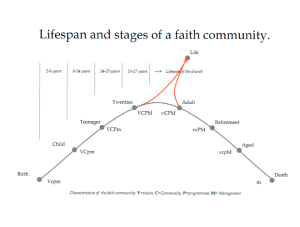
I spent parts of two days recently with a local church board in a board retreat. It was energizing for me and beneficial to the board members. Among other topics, we spent some time discussing the “Lifespan and Stages of a local Church,” and the importance of asking strategic questions.
The graph below raised a lot of questions, since the local church will celebrate next year its 75th year of existence.
Raising and discussing strategic questions about the life of the congregation, its mission, context, goals and strategy for growth demands that the pastor/leader of the board, with the support of the board members, tenaciously guard the board agenda.
What is the vision or “preferred future” for the church?
What is the most critical issue or major concern facing the board?
What three big ideas should the Board focus on for the next three years?
These and other “big questions” can only be asked and thoughtfully discussed if the board agenda has been intentionally developed. Protect the agenda! Significant reports are important. So are the blocks of time needed to discuss the big questions facing the church. A major component of the board meetings should be designated for “Items for Discussion,” and these agenda items can be most clearly addressed if they are placed on the agenda in terms of a well thought-through question(s) to be discussed. “Items for Decision” follow the discussion of big issues, usually in a subsequent board meeting.
Cultivate the discipline to “think questions.” Not just any questions. Strong and effective boards ask the right questions. The questions asked above are examples of basic, on-going questions that probe the big issues and help define the real problems. Think also about these “problemframing” questions:
Who are we? (What is our mission, vision, values?)
Where are we? (Not a location on a map, but in the ‘lifespan” of the congregation?)
Where are we going (if we continue to do as we have done?)
Where could we go (with a Spirit-inspired vision and a unified board?)
Why are we going “there”? (What is our motivation for growth?)
How will we get there? Spiritual, human and financial resources needed?
How will we know when we get there?
What legal documents need to reviewed at least annually, and made available maintained in a safe place, with copies made readability available to the board members?
What one thing, if we do not attend to this issue soon, a) could create problems for us in the near future; or b) impede our focus on discipleship training?
Which question is most needed to be asked by the board on which you serve? Why this question? Then ask the board chairperson to place the question on the agenda in an upcoming board meeting. Take the time needed, including multiple meetings, if necessary, to explore as fully as possible the big question you raised.
Pragmatist, philosopher and educator John Dewey proposed that “a problem well defined is a problem half solved.” In other words, work to clarify the real issue or problem that is creating the challenge, misunderstanding, or crisis.
Asking good questions help us define the problems well. They are essential for the big challenges or crisis situations to be addressed properly, for the relationship within the board to mature, and the work of the board to be effective.
Strong leaders are not afraid of “tough” questions from the board, and to the board during these times of severe challenges or crises. Questions that look back, evaluate the present, and anticipate the future.
Each board will shape the specific questions needed for a specific time and setting. Boards may not have immediate answers to the fiduciary, strategic, or representative challenges before them as a governing board. They must however, have the right questions.






